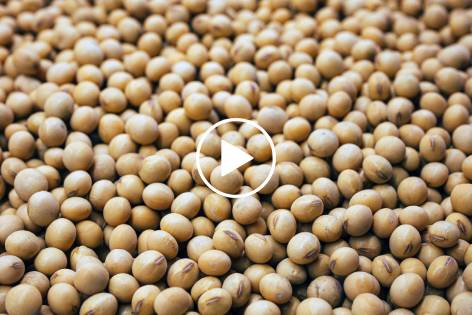
Unlocking the Potential: How Soy May Slash Your Cancer Risk
Source: Frontiers of Nutrition Journal (2022)
Lifestyle Medicine Update (October 19, 2022)
Introduction:
In the realm of nutrition and health, every morsel we consume can significantly impact our well-being. And in the pursuit of a healthier, cancer-free life, a remarkable study published in March 2022, within the revered journal *Frontiers of Nutrition*, has brought the spotlight onto a common dietary component – soy. The study amalgamated data from eighty-one prospective investigations, all united by a single mission: to decipher the relationship between soy consumption and cancer risk. What they found is nothing short of groundbreaking. The research concluded that a higher intake of soy, particularly soy isoflavones, can be associated with a substantial 10% reduction in the risk of cancer incidence. Furthermore, the study unveiled that every 10 mg per day increment in soy isoflavone intake translates into a 4% reduction in cancer risk. These revelations are nothing short of revolutionary, holding the promise of cancer prevention within our everyday diet.
Cancer Risk Reduction with Soy
By the numbers, the magic number seems to be 25 mg of soy isoflavones daily. On average, this level of intake could potentially reduce your risk of cancer by a remarkable 10%. Such protection extends to specific cancers, with particular emphasis on lung and prostate cancers. Moreover, the merits of soy’s inclusion in your diet are further underscored by a multitude of studies affirming its role in reducing the risk of cardiovascular disease. These findings resonate so convincingly that the researchers ardently advocate incorporating soy as an integral component of a healthy dietary regimen to thwart the ominous spectre of cancer.
The Unveiling of Soy’s Cancer-Preventing Secrets
The research paper further delves into the intricate details of the eighty-one studies reviewed in the meta-analysis. These investigations have illuminated the remarkable capacity of soy to diminish the incidence of several cancers. Specific types of cancer that exhibited reduced risk in the presence of higher soy intake included bladder cancer, colorectal cancer in postmenopausal women, stomach cancer, prostate cancer, and lung cancer. Notably, all studies tracking breast cancer survivors have consistently showcased the power of soy. Women who consumed at least 23 mg of soy isoflavones per day exhibited a notable reduction in breast cancer recurrence, relapse, and mortality, compared to those who eschewed soy products.
The Science Behind Soy’s Shield: How It Works
The paper elucidates how soy isoflavones contribute to the prevention of cancer. Their actions encompass bolstering antioxidant protection, possessing anti-inflammatory properties, modulating genes controlling cell division and programmed cell death (apoptosis), and inhibiting tumor cells from forming new blood vessels (anti-angiogenesis). However, it is essential to bear in mind that the effectiveness of soy isoflavones in guarding against cancer may be compromised by certain undesirable lifestyle habits. This phenomenon is evident in patients who are obese, physically inactive, smokers, and those consuming excessive amounts of alcohol. Yet, when nestled within a holistic healthy lifestyle program, daily intake of 25-75 mg of soy isoflavones stands as a robust strategy to significantly lower the risk of cardiovascular disease and overall cancer risk.
For Whom Soy is a No-Go
Of course, not all roads lead to soy. For individuals allergic to soy foods, this dietary route is off-limits. Nevertheless, for the vast majority, the revelation of soy’s protective properties against cancer is a precious piece of information.
Exploring the Soy Spectrum: Isoflavone Content in Soy Foods
In order to incorporate soy into your daily regimen, understanding the isoflavone content in different soy foods is crucial. Below is a reference list of various soy products and the amount of isoflavones they contain per 100 grams (3.5 oz or 1/5 lb):
- Miso: 41.45 mg
- Edamame: 17.92 mg
- Natto: 82.29 mg
- Soy Cheese: 6-26 mg
- Roasted Soy Beans: 148.5 mg
- Raw Soy Beans: 154.5 mg
- Soy Milk: 0.7 – 11 mg
- Tempeh: 3.82 mg
- Tofu: 13 – 35 mg
- Okara: 9.39 mg
- Soy Lecithin: 15.7 mg
- Textured Soy Flour: 172.55 mg
- Defatted Soy Flour: 151 mg
- Soy Protein Isolate: 91 mg
- Soy Protein Concentrate: 11.49 mg
- Soy Sauce: 1.18 mg
Conclusion
The path to better health and lower cancer risk is paved with dietary choices, and the potency of soy, specifically soy isoflavones, is now unequivocal. The research cited in this article beckons us to consider the potential cancer-fighting properties of soy, offering a 10% reduction in risk, with even greater reductions for specific cancers like lung and prostate cancer. A balanced diet that incorporates soy as part of a healthy lifestyle may be the key to cancer prevention. For those not allergic to soy, this information is invaluable.
With these insights into the protective power of soy, we can make informed choices to reduce our risk of cancer and embrace a healthier, cancer-free future.
References:
- Fan Y et al. Intake of Soy, Soy Isoflavones and Soy Protein and Risk of Cancer Incidence and Mortality. *Front. Nutr.*, 04 March 2022. [Read the full study here](https://www.frontiersin.org/articles/10.3389/fnut.2022.847421/full).
- Source of Soy Isoflavone Data: J Nutrients 2018. “Soy Foods and Soy Bioactive Substances.” [Read the source here](https://www.researchgate.net/publication/322292620_Soy_Soy_Foods_and_Their_Role_in_Vegetarian_Diets).
Eat Smart, Live Well, Look Great,
Dr. Meschino

Dr. James Meschino
ABOUT THE AUTHOR
Dr. James Meschino, DC, MS, ROHP, is an educator, author, and researcher having lectured to thousands of healthcare professionals across North America. He holds a Master’s Degree in Science with specialties in human nutrition and biology and is recognized as an expert in the field of nutrition, anti-aging, fitness, and wellness as well as the author of numerous books.


